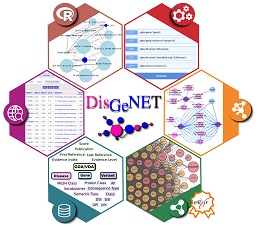
09/05/2019
New version of DisGeNET 6.0 and ELIXIR recognition
The Integrative Biomedical Informatics group of GRIB (IMIM-UPF) has launched a new version of DisGeNET, a public knowledge management platform on the genomics of disease, which is celebrating its tenth anniversary this year. DisGeNET offers information on genes and genomic variants associated with human diseases, which is obtained by integrating more than a dozen public resources and the scientific literature. DisGeNET contains one of the most comprehensive collections of genes and variants associated with human diseases that is currently available.
The new version of DisGeNET (6.0) contains approximately 600,000 associations between more than 17,000 genes and 24,000 human diseases, focusing particularly on genetic alterations associated with disease: this version includes more than 117,000 genomic variants associated with 10,000 diseases. In addition, the phenotypic landscape covered by DisGeNET has been expanded to include the genomic basis of clinical manifestations of diseases, both signs and symptoms, as well as laboratory tests results.
This version of DisGeNET incorporates new data sources, such as gene panels (PanelApp from Genomics England, ClinGen), a selection of cancer "driver" genes (Cancer Genome Interpreter), and a new catalogue of GWAS studies (GWASdb ). Another important novelty is the improvement of the automatic text mining technology used to extract information from the scientific literature. This features a new classifier based on a neural network architecture that results in a more accurate identification of genes and diseases.
DisGeNET 6.0 benefits from a completely new web interface, which includes a collection of flexible filters that can be combined to navigate and prioritise the data, in addition to a new API interface that enables programmatic access to the database, facilitating the automatic retrieval of information contained in the platform. In addition, DisGeNET can be accessed via the R disgenet2r package and the DisGeNET Cytoscape app, which have been updated with new functionalities.
Finally, we are pleased to announce that the RDF API, which allows DisGeNET to be exploited in an integrated way with other resources, has been selected as one of the 10 interoperability resources recommended by ELIXIR, the European organisation that brings together bioinformatics resources in life sciences. This recognition is awarded to resources that follow the FAIR (Findable, Accessible, Interoperable and Reusable) principles and which let computers automatically connect resources for complex queries.
In summary, DisGeNET constitutes a mature resource with growing community recognition, developed to support a variety of applications in translational bioinformatics and drug R&D.
DisGeNET can be found at http://www.disgenet.org/
More information of the 10 interoperability resources recommended by ELIXIR, at http://bit.ly/2VeWFxS



